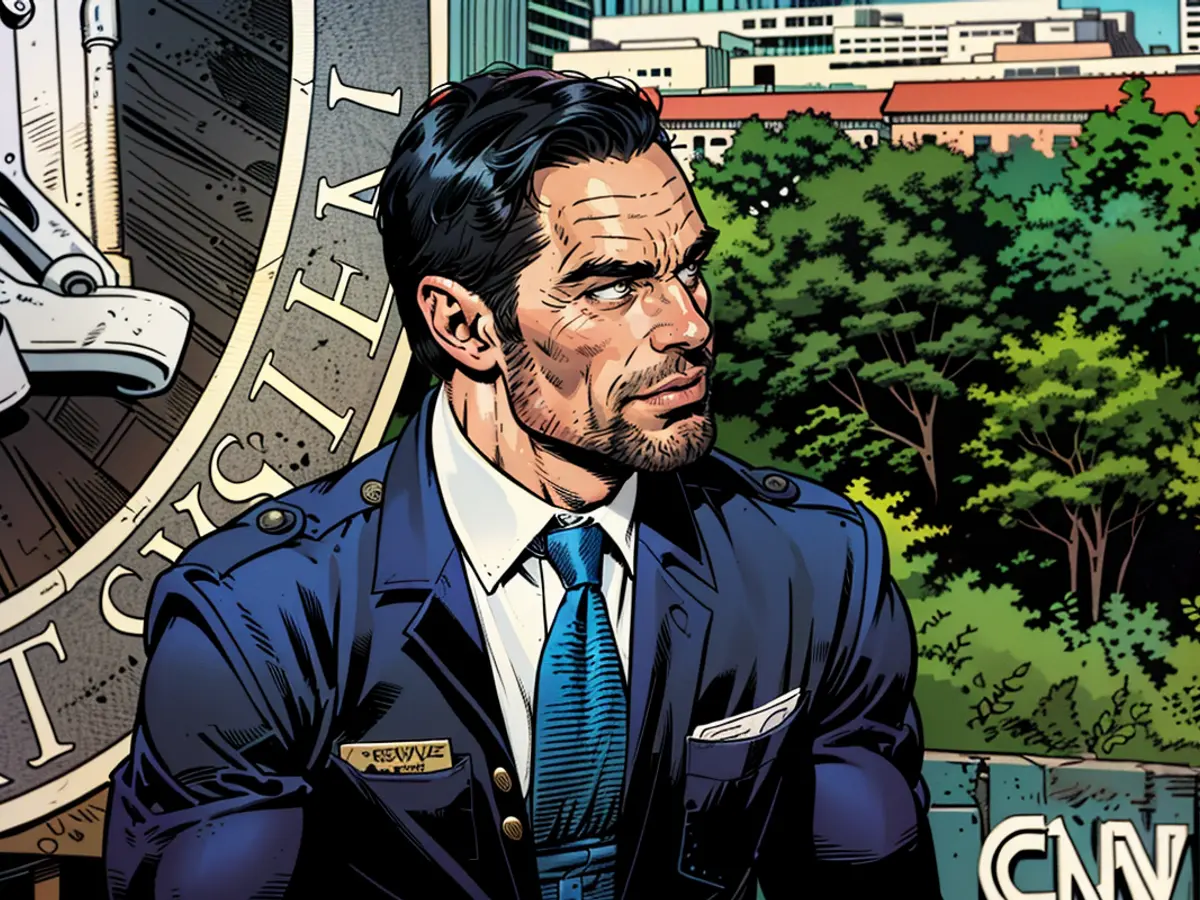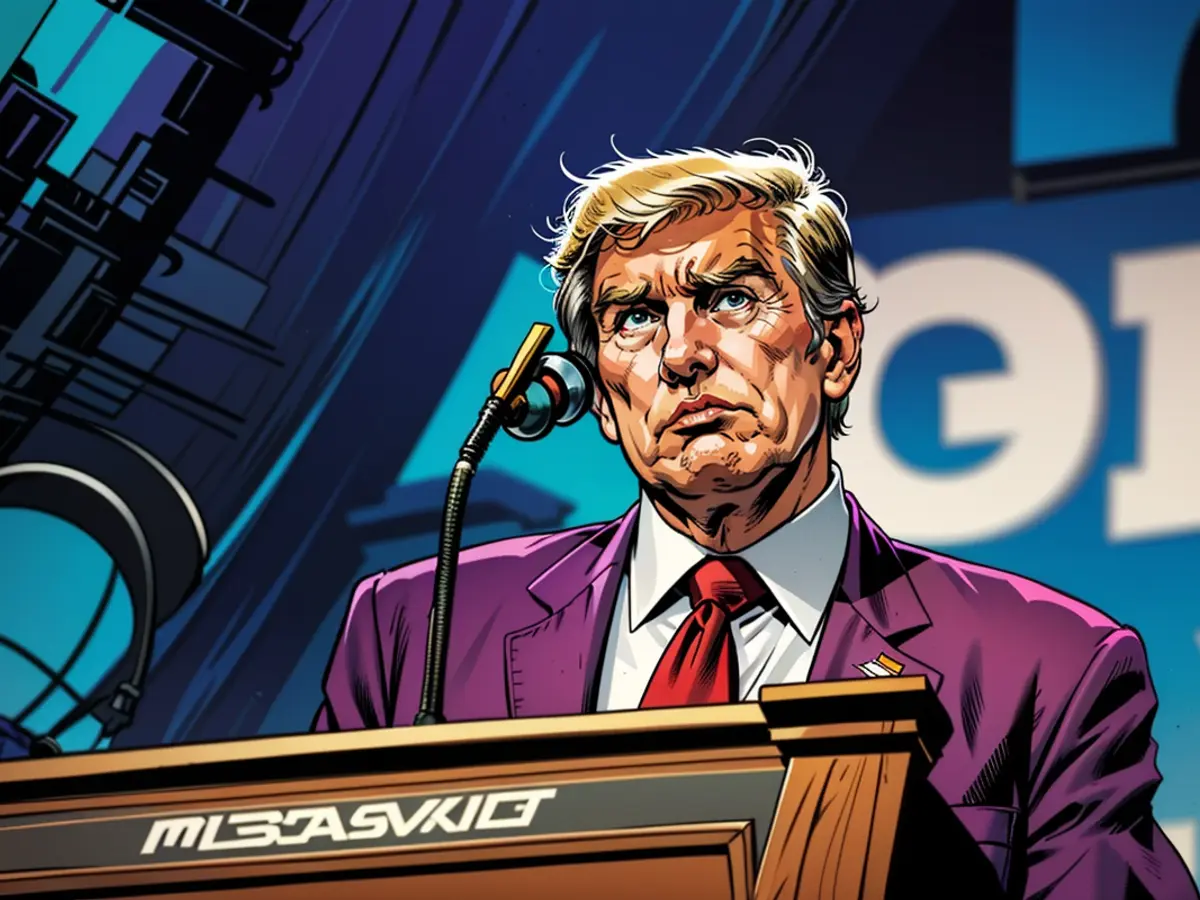Individuals are labeling Trump as a fascist. So, what does this terminology imply?
The statement places Trump's political ideology in the same category as that of notorious fascists, such as Adolf Hitler and Benito Mussolini. Trump denies this label and labels Kelly as "degenerate."
At a CNN town hall in the critical state of Pennsylvania, when asked if she agrees with journalist Mehdi Hasan's statement that Trump is a fascist, the Democratic presidential nominee, Vice President Kamala Harris, did not hold back.
"Yes, I do. Yes, I do," she replied.
Hasan referred to a definition of fascism: "It's a far-right authoritarian, ultranationalist political ideology and movement characterized by a dictatorial leader, centralized autocracy, militarism, forcible suppression of opposition, belief in a natural social hierarchy."
"Certainly, in my experience, those are the kinds of things that he thinks would work better in terms of running America," Hasan said.
Hasan also stated that Trump is on the "far-right spectrum," and "admires people who are dictators," which, according to Hasan's perspective, places Trump in the "general definition of fascist."
Using the military to suppress opposition
There are valid arguments to support Hasan's position. Trump's suggestion of using the military against "enemies within" the US, including Democrats like Representatives Nancy Pelosi and Adam Schiff, certainly has fascist undertones. However, his Republican supporters argue it's just hyperbole.
Trump attempted to use the military to interrupt domestic protests during his presidency, which his then-Chairman of the Joint Chiefs, General Mark Milley, rejected, according to 2021 reports. Milley also privately compared Trump's denial of election results to Hitler's "big lie."
Even if Trump does not intend to use the military against Democrats, he has a history of attempting to use the military to suppress protests in the US, which threatens dissent.
Sidelining dissent
Trump recently said he would fire Special Counsel Jack Smith "within two seconds" if he wins the election, which seems clear since Smith has indicted Trump in cases related to election interference and mishandling classified documents.
The election interference case is scheduled after the election, and a different judge dismissed the classified documents case, although Smith has appealed.
Trump has a history of firing officials who question him. He fired FBI Director James Comey when he was in office. He fired his first attorney general, Jeff Sessions, after never forgiving Sessions for appointing a special counsel to investigate potential collusion between Trump's campaign and Russia during the 2016 election.
The resultant report from special counsel Robert Mueller has been referred to as the "Russia hoax" so many times by Trump and his allies that most Americans probably don't remember that Mueller did not exonerate Trump of obstruction of justice in the report. Mueller identified multiple contacts between Trump's campaign and Russians in 2016, a period when Russia was actively trying to help Trump's campaign. Mueller concluded that the contacts did not rise to the level of conspiracy.
Trump's second attorney general, Bill Barr, delayed the release of Mueller's report to dilute its impact. Barr later left Trump's administration after refusing to support Trump's unsubstantiated election interference conspiracy theories.
Democrats wonder who would be left to temper Trump's impulses if he's reelected.
Purge of government institutions
If he wins the election, Trump has promised to go to war with what he perceives as a "deep state" of bureaucrats at the Justice Department, the FBI, and the Pentagon.
He has also suggested using the justice system to prosecute election officials.
All of this suggests a thematic alignment with certain elements of fascism, centered on a strong leader and where dissent in the government is dismissed. However, there can be more to fascism, such as complete control of the German economy and society. Trump has not suggested anything like that.
While Harris is only now admitting that Trump is a fascist, he has been calling her Marxist throughout the presidential campaign, referring to her as "Comrade Kamala." However, Harris supports private ownership.
Trump has adopted the term
In June, Trump said the US is a "fascist state" as he pushed the unfounded conspiracy theory that President Joe Biden was behind his prosecution in New York for falsifying business records related to hush money payments made on Trump's behalf to a porn star in 2016.
I delved into the definition of fascism and how it applied to Trump back in June, when he was using the term.
There are experts who view Trump as fascist. Robert Paxton, a Professor Emeritus at Columbia University who has written widely on fascism in Europe, rejected the label for Trump until January 6, 2021, when the historian argued that the image of Trump supporters storming the US Capitol "removes my objection to the fascist label."
Trump has also repeatedly used language tied to Nazis, such as when he said immigrants are "poisoning the blood" of the country.
'I don't care what you call this'"
When CNN's Wolf Blitzer asked Ohio Senator JD Vance in May about Trump's claim that the US is a "fascist state," Vance would not reject the idea, indicating at least a tolerance for the term.
"I don't care what you call this, but this is not the America that I know and love," Vance, who was not yet Trump's running mate, said in a tense exchange.
In June, I chatted with Daniel Steinmetz-Jenkins, an assistant professor at Wesleyan University and editor of the book, "Did It Happen Here? Perspectives on Fascism and America," which includes Paxton's work, along with numerous others.
He stated that the model of historical comparison, which involves examining what transpired in Germany during the 1930s and utilizing it as a guideline or map to comprehend the present, is widely used. However, there are criticisms that it's an inappropriate comparison.
"Concepts don't hold timeless fundamental truths that can be easily applied to any phenomenon, but they evolve based on the political context and the power structures within society," he explained.
Currently, Steinmetz-Jenkins mentioned that the term "fascism" is being used "to unite individuals and overcome their differences, to combat an adversary that is perceived to be more dangerous than their own long-standing disagreements."
He argued that the labeling of opponents as "fascist" has a long history, dating back to Franklin D. Roosevelt, with individuals on both sides of the political spectrum using it. Furthermore, American legislators have threatened their opponents with investigations.
Although there are arguments in favor of the fascism comparison, there are also arguments against it, particularly given the resemblances between Trump's rise and populist and White nationalist movements in American history.
I subsequently spoke with Steinmetz-Jenkins to ascertain if the comparisons had shifted in the interim months, and he pointed out that the fascism debate had subsided over the summer, with Harris replacing Biden – and he noted that for the majority of Harris' campaign, a message of joy in politics had replaced the fear of fascism.
However, as Democrats become more anxious about losing to Trump, the threat of fascism has resurfaced.
"What's necessary is a strategy to motivate people to vote for the Democrats, not intimidation tactics that might lead to a sense of despair that the world is being overwhelmed by fascism," he stated.
Nowadays, there are enough American voters who have heard the term "fascism" in connection with Trump that if he triumphs in November, it will be evident that they at least are willing to tolerate it or don't believe he will implement what he promises.
In light of Trump's proposal to use the military against perceived enemies within the US and his history of attempting to suppress dissent, including firing officials who question him, his political ideology can be seen as having fascist undertones.
Trump's promise to go to war with perceived enemies within government institutions like the Justice Department, FBI, and Pentagon if he is reelected is reminiscent of the suppression of opposition that is characteristic of fascist regimes.










